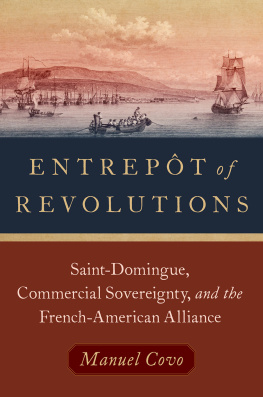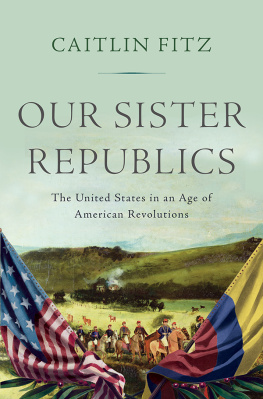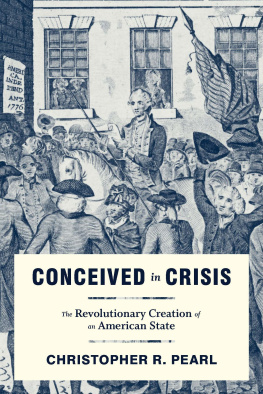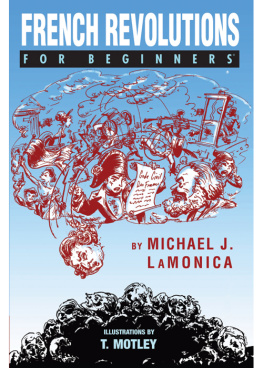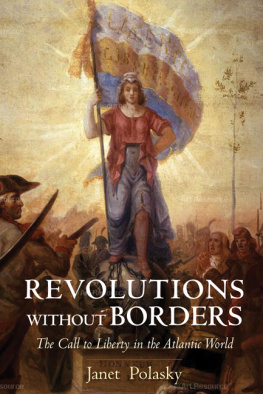Entrept of Revolutions

Oxford University Press is a department of the University of Oxford. It furthers the Universitys objective of excellence in research, scholarship, and education by publishing worldwide. Oxford is a registered trade mark of Oxford University Press in the UK and certain other countries.
Published in the United States of America by Oxford University Press
198 Madison Avenue, New York, NY 10016, United States of America.
Oxford University Press 2022
All rights reserved. No part of this publication may be reproduced, stored in a retrieval system, or transmitted, in any form or by any means, without the prior permission in writing of Oxford University Press, or as expressly permitted by law, by license, or under terms agreed with the appropriate reproduction rights organization. Inquiries concerning reproduction outside the scope of the above should be sent to the Rights Department, Oxford University Press, at the address above.
You must not circulate this work in any other form and you must impose this same condition on any acquirer.
Library of Congress Control Number: 2022943896
ISBN 9780197626399 (pbk.)
ISBN 9780197626382 (hbk.)
ISBN 9780197626412 (epub.)
DOI: 10.1093/oso/9780197626382.001.0001
Contents
This book has been long in the making. Its completion would not have been possible without many sources of support on both sides of the Atlantic. I want to express my deep gratitude to everyone who has helped me along the way.
It all began at the Ecole des Hautes Etudes en Sciences Sociales in Paris. Because Franois Weil at the Centre dtudes nord-amricaines (CENA) believed in the project from the outset, I was able to start the tumultuous and thrilling research journey that led from a French dissertation to Entrept of Revolutions. Although the experience might have felt lonely at times, I had the constant support of Ccile Vidal, my mentor, who always pushed me to be more rigorous with the concepts I used and to continuously think more deeply. This book owes her more than I can say. At the CENA, I received rigorous training from Pierre Gervais in economic history that shaped my understanding of merchant capitalism in the age of revolutions. I was very fortunate that Pierre included me in his Agence Nationale pour la Recherche project on merchant profits. I learned much from the remarkable, rigorous, and often hilarious mentors in this project group, in particular Natacha Coquery, Yannick Lemarchand, Dominique Margairaz, and Allan Potofsky. Moreover, the community of Mondes Amricains at EHESS was rich and extensive. I want to thank Gilles Havard who read many drafts and gave me incisive (and friendly!) feedback. Romy Sanchez was my partner in crime from the days of the conseil scientifique to the Caribbean lecture series we coordinated at the Ecole. Her support and penetrating comments substantially improved this book. Exchanges with Virginie Adane, Camille Amat, Nicolas Barreyre, Sonia Birocheau, Elsa Devienne, Sarah Faraud, Cline Flory, Fanny Malgue, Emmanuelle Perez-Tisserand, Marieke Polfliet, and Clment Thibaud profoundly influenced the content of this book. The stimulating team that Ccile Vidal gathered to produce Une histoire sociale du nouveau monde was another fantastic scholarly community: I want to thank Vincent Cousseau, Claudia Damasceno, Antonio de Almeida-Mendes, Aude Argouse, Charlotte de Castelnau LEstoile, Marie Houllemare, Aliocha Maldavski, Federica Morelli, and Jean-Frdric Schaub for pushing me to consider the topic from a broader perspective. Special mention is owed to Jean Hbrard, Dominique Rogers, and Franois-Joseph Ruggiu, whose advice and feedback have been invaluable.
The Institut dhistoire de la Rvolution franaise at Universit Paris 1 Panthon-Sorbonne was my second academic home. I hope that what I learned from the great historian on the French Revolution, Jean-Clment Martin, shines in this manuscript. It is also impossible to exaggerate this books indebtedness to the scholarship and kindness of Bernard Gainot, a titan in the field. Pierre Serna has systematically included me in the projects of the Institut and inspired me in so many different ways. Frdric Rgents suggestions on my project have been similarly very helpful. Virginie Martin, who has been accompanying me since the years spent in Lyon, has been present at every turn: a brilliant companion I could continuously rely on and learn from. Friends and colleagues at Paris 1 provided support and insights: I am grateful to Jean-Luc Chappey, Guillaume Mazeau, Fabrice Micallef, and Clyde Plumauzille. Connected to the Institut, the Association pour ltude de la colonisation europenne was another remarkably inspiring community. It was led by Marcel Dorigny, whose recent passing has created an immense gap in the field.
On the other side of the Atlantic, the year I spent as a Fulbright doctoral fellow at New York University transformed my research in foundational ways. John Shovlin was and has remained a wonderful mentor: he helped me understand the fundamental differences between the French and the US scholarship on the French Revolution. With her captivating seminar on the Age of Revolutions, Ada Ferrers influence on the genesis of this book was likewise essential.
The research and writing of Entrept of Revolutions benefited from generous financial support from several institutions. I received an Ecole Normale Suprieure and Ecole des Hautes Etudes en Sciences Sociales doctoral grant, a Fulbright fellowship from the French-American commission, a Harvard Atlantic seminar grant, and funding from the Agence Nationale de la Recherche MARPROF project. The dissertation at the foundation of this book was awarded the Ecole des Hautes Etudes en Sciences Sociales best dissertation of the year prize and the best 2014 Francophone dissertation on the history of slavery prize by the Comit pour lhistoire et la mmoire de lesclavage foundation.
Three fellowships proved crucial to this book: they provided not only funding and time to conduct research but also guidance from directors and librarians and immersion within outstanding intellectual communities. The postdoctoral fellowship in the Program in Early American Society at the Library Company in Philadelphia was a life-changing experience. I discovered a lot of materials that did not make it into the book but have opened up new directions for research. I am especially grateful to the fantastic mentorship of Cathy Matson who helped me substantially reframe the manuscript. Fellows in my cohort, in particular Randy Browne, Aston Gonzalez, Brian Luskey, and Rachel Walker, contributed to make my Philadelphia stay very productive. I discovered new archival sources thanks to the John Carter Brown Library fellowship and benefited from the insights of Kathryn Burns, Brnice Gaillemin, Sarah Newman, Justin Pope, Lorenzo Ravano, and Nancy E. Van Deusen. I want to give special mention to Neil Safier whose indescribable help was decisive in the course of my research career. Last but not least, I was highly privileged to write most of the chapters of this book as a postdoctoral fellow at the Huntington Library. That was an extraordinary experience: there I benefited from exchanges with director Steve Hindle, librarian Sara Austin, and fellows Daniela Bleichmar, Kristen Block, Katherine Cox, Marjoleine Kars, Gregory Nobles, Jessica Rosenberg, Martha Sandweiss, Alexander Statman, and Danielle Terrazas Williams.

